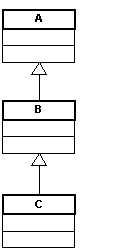| Overview One of the fundamental concepts of object oriented software development is polymorphism. The term polymorphism (from the Greek meaning "having multiple forms") in OO is the characteristic of being able to assign a different meaning or usage to something in different contexts - specifically, to allow a variable to refer to more than one type of object. Example Class Hierarchy Let's assume the following simple class hierarchy with classes A, B and C for the discussions in this text. A is the super- or base class, B is derived from A and C is derived from class B. In some of the easier examples, we will only refer to a part of this class hierarchy.  Inherited Methods A method Foo() which is declared in the base class A and not redeclared in classes B or C is inherited in the two subclasses using System;
namespace Polymorphism
{
class A
{
public void Foo() { Console.WriteLine("A::Foo()"); }
}
class B : A {}
class Test
{
static void Main(string[] args)
{
A a = new A();
a.Foo(); // output --> "A::Foo()"
B b = new B();
b.Foo(); // output --> "A::Foo()"
}
}
}
The method Foo() can be overridden in classes B and C: using System;
namespace Polymorphism
{
class A
{
public void Foo() { Console.WriteLine("A::Foo()"); }
}
class B : A
{
public void Foo() { Console.WriteLine("B::Foo()"); }
}
class Test
{
static void Main(string[] args)
{
A a;
B b;
a = new A();
b = new B();
a.Foo(); // output --> "A::Foo()"
b.Foo(); // output --> "B::Foo()"
a = new B();
a.Foo(); // output --> "A::Foo()"
}
}
}
There are two problems with this code. - The output is not really what we, say from Java, expected. The method Foo() is a non-virtual method. C# requires the use of the keyword virtual in order for a method to actually be virtual. An example using virtual methods and polymorphism will be given in the next section.
| - Although the code compiles and runs, the compiler produces a warning:
...\polymorphism.cs(11,15): warning CS0108: The keyword new is required on 'Polymorphism.B.Foo()' because it hides inherited member 'Polymorphism.A.Foo()' | This issue will be discussed in section Hiding and Overriding Methods. Virtual and Overridden Methods Only if a method is declared virtual, derived classes can override this method if they are explicitly declared to override the virtual base class method with the override keyword. using System;
namespace Polymorphism
{
class A
{
public virtual void Foo() { Console.WriteLine("A::Foo()"); }
}
class B : A
{
public override void Foo() { Console.WriteLine("B::Foo()"); }
}
class Test
{
static void Main(string[] args)
{
A a;
B b;
a = new A();
b = new B();
a.Foo(); // output --> "A::Foo()"
b.Foo(); // output --> "B::Foo()"
a = new B();
a.Foo(); // output --> "B::Foo()"
}
}
} Method Hiding Why did the compiler in the second listing generate a warning? Because C# not only supports method overriding, but also method hiding. Simply put, if a method is not overriding the derived method, it is hiding it. A hiding method has to be declared using the new keyword. The correct class definition in the second listing is thus: using System;
namespace Polymorphism
{
class A
{
public void Foo() { Console.WriteLine("A::Foo()"); }
}
class B : A
{
public new void Foo() { Console.WriteLine("B::Foo()"); }
}
class Test
{
static void Main(string[] args)
{
A a;
B b;
a = new A();
b = new B();
a.Foo(); // output --> "A::Foo()"
b.Foo(); // output --> "B::Foo()"
a = new B();
a.Foo(); // output --> "A::Foo()"
}
}
} Combining Method Overriding and Hiding Methods of a derived class can both be virtual and at the same time hide the derived method. In order to declare such a method, both keywords virtual and new have to be used in the method declaration: class A
{
public void Foo() {}
}
class B : A
{
public virtual new void Foo() {}
}
A class C can now declare a method Foo() that either overrides or hides Foo() from class B: class C : B
{
public override void Foo() {}
// or
public new void Foo() {}
} Conclusion - C# is not Java.
- Only methods in base classes need not override or hide derived methods. All methods in derived classes require to be either defined as new or as override.
- Know what your doing and look out for compiler warnings.
|
No comments:
Post a Comment